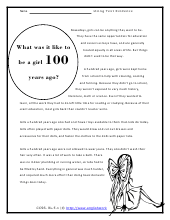Using Quotes From Text Worksheets
Related ELA Standard: RL.5.1

Quotes are instances of people speaking directly. Handling the mechanics of quotes is often awkward for most students. You can also quickly tell if the quote you are viewing is a complete sentence or just a fragment. If the quoted text is capitalized, it is a complete sentence. Sometimes you will run into quotes within quotes. In this case single quotation marks are used. This series of worksheets will help students learn how to dissect quotes and use them in their own work.
Using Quotes Worksheets To Print:
Tiny Houses -
Americans love big houses, but that thought process is in a state
of change.
Danger - Drama shifts
into high gear on a recent flight.
Poor Henry - Josh
and Larry meet up with Henry the lizard at a local pet store.
Founding Farmers
- Did you know that Washington and Franklin were farming geeks?
What
Did You Just Say? - Read the famous quotes about achieving success
and then explain what each of them means, based on what you have inferred
from the text.
Dragon Boat
Racing - Dragon boat racing comes from ancient techniques of
naval warfare in China. There is also a legend that dragon boat racing
frightens and drives away evil spirits.
Schools
in 1912 - In 1912, it was very common in rural areas for school
to be a single room in which one teacher taught all the children.
Benjamin Franklin
- Benjamin Franklin is one of the most well-known, well-respected
and admired figures in American history.
Serval
- The serval is a wild cat that is similar in build to a cheetah.
Do Animals
Talk? - Humans have a voice box, which is a complex set of chords
in our throats that vibrate when air moves through them.
Me and
Madeline - I am a ghost. I've been eleven years old for a hundred
years. I've lived in the same house my whole afterlife, which is the
same house I lived in for my life.
Gladiators
- In ancient Rome, men called gladiators were trained to fight with
weapons against other men, and sometimes against wild animals.
Imagination
All-Stars - Read the stories. Match each story with its illustration.
Underline the words that helped you to decide.
At the
Playground - Read the story. At the end of each paragraph, answer
the question by making an inference about what you just read. Write
your answer on the line.
When Do You Use Quotation Marks?
Quotation marks are one of the most difficult punctuation marks to use in the English language writing. The rules determining their usage are often confusing and create a lot of issues especially for new learners. The existence of quotation marks in double marks and single marks forms add more to the already prevailing confusion regarding their usage.
Quotation marks either look like "" and are known as double quotation marks or look like '' when they are in single form. There are a number of reasons to use these quotation marks as well as rules determining their usage. Keeping these in mind can bring ease in the process of writing and reduce confusion whenever there is a need to use these marks.
For Direct Quotations
Double quotation marks surround a statement from someone else that is directly quoted in another text. For example: "When I say go away, you must go away", said the boss. There is usually a comma separating the direct quotes and the other parts of the sentence that are usually referring to the direct quote's speaker.
For Quotes Within Direct Quotations
Sometimes, an important word or phrase within a direct quotation has to be put inside another set of quotation marks to highlight its importance. In such cases, the direct quotations are written within double quotation marks while the important word or phrase is enclosed in single quotation marks within the direct quote. For example: "When I said 'I hate you', I really didn't mean it."
For Specialized Terms in Specialized Writing
While writing about a specialized field, some words used are a part of the particular jargon or register relevant to that field only. One can put those specialized terms in single quotation marks within the text to highlight such words.

